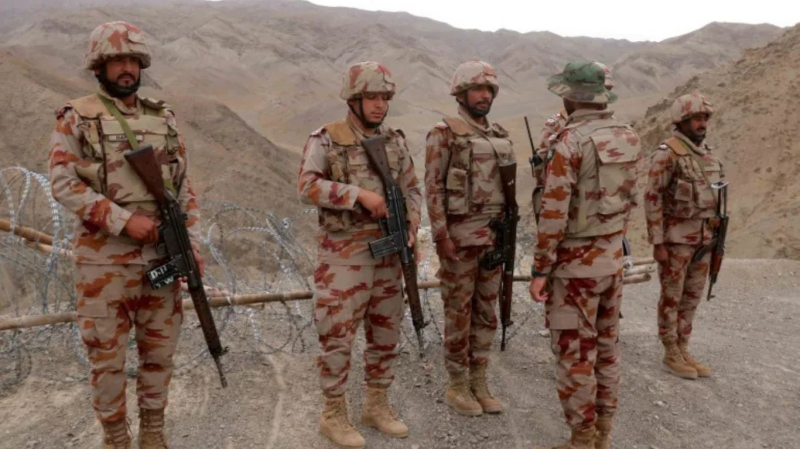- WHO Warns Global Surge in Antibiotic Resistance |
- Dhaka stocks rebound after five-day losing streak |
- Cox’s Bazar Airport Upgraded to International Status |
- With $80 per capita Bangladesh is getting trappeded in climate debt |
- Dhaka’s air recorded ‘unhealthy’ Monday morning |
Pakistan–Afghanistan Border Erupts Again Amid Rising Tensions

Pakistani soldiers stand guard at the Ikram post on the Pakistan-Afghanistan border in Chaman, Pakistan.
Deadly border clashes between Pakistani and Afghan forces have reignited tensions along the volatile frontier, leaving scores dead and marking one of the most serious confrontations since the Taliban’s return to power in 2021.
According to Afghan officials, at least 58 Pakistani soldiers were killed and 25 army posts captured in “retaliatory” overnight attacks. Pakistan confirmed 23 fatalities, claiming to have killed 200 Taliban fighters and destroyed several border positions. Islamabad’s interior minister called the Afghan assault “unprovoked firing.”
The violence erupted late Saturday in several border regions — including Angoor Adda, Bajaur, Kurram, Dir, Chitral, and Bahram Chah — following explosions in Kabul and Paktika days earlier. The Taliban administration accused Pakistan of conducting those bombings, though Islamabad neither confirmed nor denied involvement.
In response, Pakistan’s military said its forces “repelled the assault decisively,” briefly seizing 21 Taliban positions and destroying “terrorist training camps” along the border. Sporadic gunfire continued into Sunday in parts of Kurram district.
Strained Allies Turn Adversaries
Once allies during the Taliban’s fight against U.S.-led forces, Pakistan and Afghanistan have grown increasingly hostile. Islamabad accuses the Taliban of harbouring militants from the Tehrik-e-Taliban Pakistan (TTP), responsible for hundreds of attacks inside Pakistan. Kabul denies the charge.
Pakistan has frequently carried out airstrikes inside Afghan territory targeting alleged TTP hideouts. Analysts say a recent surge in TTP attacks against Pakistani troops likely triggered this week’s deadly exchanges.
“The message was clear — if the Afghan Taliban can’t rein in the TTP, Pakistan will act on its own,” said Mehmood Jan Babar, a Peshawar-based security analyst. He noted that internal sympathies for the TTP within Taliban ranks make it difficult for Kabul to act decisively.
Tensions have also deepened over Pakistan’s decision to deport thousands of Afghan refugees, straining humanitarian and diplomatic ties.
Official Reactions
Prime Minister Shehbaz Sharif condemned the Taliban’s “provocations,” saying Pakistani forces delivered a “befitting response.” Interior Minister Mohsin Naqvi accused Afghanistan of firing on civilians, calling it a “violation of international law.”
Kabul’s Defence Ministry spokesperson Enayatullah Khowarazmi said the attacks were a retaliatory operation and warned of further action if Pakistan violated Afghan airspace again.
International Response
The escalating conflict has drawn concern across the region. Iran, Qatar, and Saudi Arabia urged both countries to exercise restraint and resolve their disputes through dialogue. Riyadh reaffirmed its “support for efforts promoting peace and stability” in South Asia.
India, hosting Afghan Foreign Minister Amir Khan Muttaqi at the time, has yet to comment. Analysts suggest Pakistan’s military escalation could be partly motivated by concerns over Kabul’s growing diplomatic ties with New Delhi.
What Lies Ahead
Experts believe both sides are unlikely to seek a wider conflict. Former Pakistani ambassador Asif Durrani said Afghanistan lacks the conventional military capability to sustain a war with Pakistan.
“Neither side wants major escalation — Pakistan faces internal security challenges, and the Taliban must maintain control at home,” said Ibraheem Bahiss, a Kabul-based analyst.
However, the TTP issue remains the core irritant. As long as Islamabad believes the Taliban are sheltering its fighters, relations are expected to remain fraught.
“Diplomacy is the only path forward,” said Babar. “Both nations share allies like China, Saudi Arabia, and Russia — none of whom want this border to explode.”

